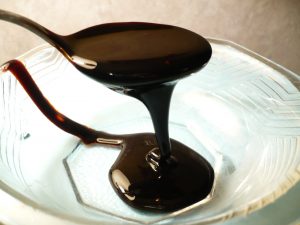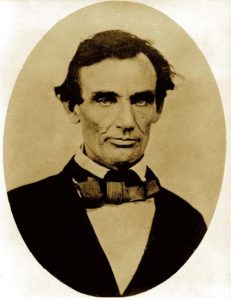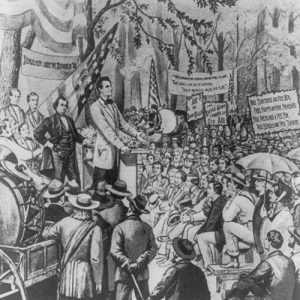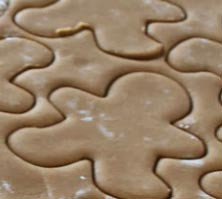Eating Like a President: Lincoln’s Gingerbread

Molasses is derived from cane sugar, a common product of the southern states before the war. To make molasses, sugar cane is harvested and stripped of leaves. Its juice is extracted, usually by cutting, crushing, or mashing. The juice is boiled to concentrate it, promoting the crystallization of sugar. The result of this first boiling is called first syrup, and it has the highest sugar content. First syrup is usually referred to as cane syrup, as opposed to molasses. Second molasses is created from a second boiling and sugar extraction. This version has a slightly bitter taste.
The third boiling of the sugar syrup yields thick, dark blackstrap molasses, known for its robust flavor. The majority of sugar from the original juice has crystallized and been removed. Unlike highly refined sugars, it contains significant amounts of vitamins and minerals, including calcium, magnesium, and iron. It has long been sold as a dietary supplement, although such claims are fairly unsubstantiated. Blackstrap molasses is significantly more bitter than “regular” molasses, but its flavor is distinctly southern and was beloved of my Louisiana stepfather.
Flavoring baked goods with molasses has been around since at least medieval times if not before. Both northern and southern families loved the mélange of flavors—molasses, ginger, orange, allspice—that scented the kitchen every winter for the holidays, and that continues on today—at least in my house. ECW presents a couple of parallel posts concerning the presidents of both areas and their holiday traditions involving spicy goodness.

Abraham Lincoln was not known as a big foodie, but he did speak about his affection for gingerbread men during the first Lincoln-Douglas debate. It all began in a civil manner, with Stephen Douglas complimenting his opponent. But then, Douglas personally attacked Lincoln over some version of the slavery issue. Lincoln, always looking for a way to smooth stormy waters, responded with a story from his childhood. Once in a while, even a family as poor as the Lincolns would get their hands on sorghum and some spices to make gingerbread. His mother saved some of the batter and added more flour, creating cookie dough. She cooked three gingerbread men for little Abe, who took them outside to eat under a hickory tree.
As he sat there, enjoying his treat, another poor boy came along and asked Abe for one of the cookies. Abe obliged him, but the boy ate the cookie so quickly that it was gone before Abe had hardly eaten the legs off his “man.” The boy looked longingly at the last cookie, and then asked for it as well. “You seem to like gingerbread men,” observed young Abe.
The boy replied, “Abe, I surely do. I don’t suppose anybody on earth likes gingerbread better than I do and gets less than I do.”

Lincoln then turned to Douglas and said he could not understand how he had been so completely blindsided by Douglas’s early flattery. It was much like that young boy and the gingerbread. . . “I was not very accustomed to flattery and it came the sweeter to me. I was rather like the Hoosier, with the gingerbread, when he said reckoned he loved it better than any man, and got less of it.”[1]
 Neither Lincoln’s mother or his wife, Mary, left any gingerbread recipes. In their absence I will include here my favorite—although not from the 1800’s, it is still 50 years old:
Neither Lincoln’s mother or his wife, Mary, left any gingerbread recipes. In their absence I will include here my favorite—although not from the 1800’s, it is still 50 years old:
½ C. shortening
½ C. sugar
1 egg
½ C. dark molasses
1 ½ C. sifted, all-purpose flour
¾ tsp. salt
¾ tsp. soda
2 tsp. ground ginger
1 tsp. ground cinnamon
½ tsp. powdered cloves
½ C. boiling water
Cream shortening and sugar until light. Add egg and molasses; beat thoroughly. Sift together dry ingredients. Add to creamed mixture alternately with water, beating after each addition.
Bake in a greased and floured 8x8x2-inch pan at 350 degrees for 35-40 minutes. Serve warm.[2]
[1]http://www.americantable.org/2013/01/recipe-abraham-lincoln-and-his-gingerbread-me1
[2]Better Homes and Gardens New Cook Book, New York: Meredith Press, 1968, 69.

2 Responses to Eating Like a President: Lincoln’s Gingerbread